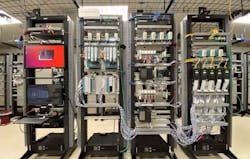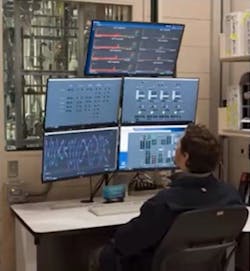How COVID-19 Pushed ExxonMobil’s Automation Technology Limits
COVID-19 created the conditions that “pushed us to test our limits and we learned that we could do a lot more work remotely than we previously thought,” said Dominic Clausi, vice president of engineering, ExxonMobil Research and Engineering, during a presentation at the 2021 virtual ARC Forum. “The time efficiency [gained] doing remote work or remote support allowed us to actually better leverage our technical resources to improve the coverage of those events we were supporting remotely.”
Prior to the onset of the pandemic, Clausi said it was generally perceived at ExxonMobil that the perceived risk associated with remote access and support would render it less effective than the in-person support the company had traditionally relied upon.
Speaking of industrial companies in general, Clausi said, “We often have the tendency to overestimate the risk and underestimate the value of digital technologies.”
One example of a remote access and support advance made at ExxonMobil in 2020 involved the company’s Baton Rouge, La., isopropyl alcohol facility. Isopropyl alcohol is a key ingredient in hand sanitizers and disinfectant sprays, so demand for this facility’s product increased at a rapid pace in early 2020. Clausi said ExxonMobil was able to “leverage our remote connectivity tools with our advanced dynamic matrix control capability to rapidly and remotely update control applications. And we did that in sync with physical modifications we were making to the unit at the time. [Remote connectivity] allowed us to very rapidly expand the production capability of that unit and that helped us meet what was really a step change in demand growth and meet a key societal need.”
Beyond pandemic-related benefits
Clausi also mentioned the value ExxonMobil discovered in remote access technology when Hurricane Laura impacted its Beaumont, Texas, facility in 2020. “We had just set up a machinery monitoring group in one of our technical centers in Malaysia when our Beaumont facility was working through an orderly shutdown in preparation for the hurricane,” he said. Because the staff in Beaumont had to perform the shutdown with a reduced number of engineers on site to manage the COVID-19 risk, remote monitoring capabilities allowed engineers in Malaysia to help guide the staff in Beaumont through the shutdown.
ExxonMobil is also piloting the use of video images for process control for a program that uses mathematical models to interpret video images and then translate them into signals that can be used to monitor and ultimately control an operation.
Engineers in Malaysia were able to observe “critical machines in detail as they were being brought down,” Clausi said. “The remote connectivity and visibility of the data allowed us to do engineering support during an abnormal operation from across the globe. In addition, the team in Malaysia was able to uncover vulnerabilities that ultimately could have compromised an orderly restart and address those vulnerabilities before the units came back up.”
Accelerated work with remote access and support technologies were not the only technology related advances experienced as a result of the pandemic, according to Clausi. ExxonMobil also pushed its use of robotic inspections further. “During the pandemic there was a premium on minimizing the number of people at our sites, as well as limiting the personal interactions in the field and this helped drive the deployment of various robotic inspection techniques that we had currently under development,” he noted.
ExxonMobil’s tech outlook
Beyond robotics and remote access, another area in which ExxonMobil sees significant opportunity is in autonomous operations and process control. Clausi noted that, in ExxonMobil’s manufacturing facilities, operators are tasked with running complex processes safely and efficiently 24 hours a day, seven days a week and “they need to synthesize large quantities of data and manipulate potentially hundreds of variables to optimize an outcome. And that makes this a rich area to leverage digital technology.”
In response, Clausi said ExxonMobil is pursuing the development of what they call an intelligent self-optimizing planner. “The goal here is to take advantage of cognitive learning and adaptive capabilities based on artificial intelligence and machine learning to reduce human error and make better decisions,” he said.
Clausi noted that this SmartLane technology is already deployed on ExxonMobil’s polymer plants and the company is in the process of adapting it for other platforms across its facilities.
ExxonMobil is also piloting the use of video images for process control for a program that uses mathematical models to interpret video images and then translate them into signals that can be used to “monitor and ultimately control an operation,” said Clausi. “This becomes particularly useful in areas where traditional instrumentation falls short, like monitoring the control of a flare.”
Another technology in the early stages of development at ExxonMobil is a virtual assistant for a console operator called Sofia. “Sofia means wisdom in Greek,” explained Clausi, “and the way to think of Sofia is that it’s like Amazon Alexa but designed for console operators. It will contextualize and mine data from various sources and then provide real-time answers to the challenging questions that an operator has in the day-to-day operation of the unit.”
Read about other uses of digital assistants in industry in the Automation World feature article: “Are Virtual Assistants Headed to the Factory Floor?”
About the Author
David Greenfield, editor in chief
Editor in Chief

Leaders relevant to this article:


